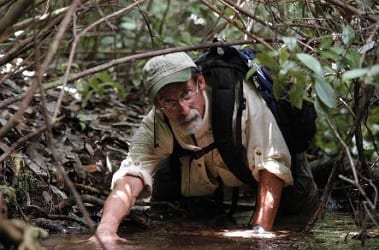Florida Declared a Global Biodiversity Hotspot
 The North American Coastal Plain – the low-lying land stretching from Texas to Florida to New England – was recently named the 36th biodiversity hotspot in the world, highlighting the importance of this region, but signaling concerns over threats to the plant and animal life there.
The North American Coastal Plain – the low-lying land stretching from Texas to Florida to New England – was recently named the 36th biodiversity hotspot in the world, highlighting the importance of this region, but signaling concerns over threats to the plant and animal life there.
UCF Biology professor, Reed Noss, Ph.D., was the lead author of a scientific study that landed Florida and the rest of the North American Coastal Plain on the list and now his research is helping uncover solutions to these problems, such as controlled burns, proper road planning and legislation.
Dr. Noss is a Davis-Shine Professor of Conservation Biology and the President of the Florida Institute for Conservation Science. He has directed ecological and conservation studies in Florida, throughout the Southeastern United States, Pacific Northwest, Rocky Mountains and Canada.
Dr. Noss is one of several UCF researchers working to better understand Florida landscapes and wildlife so that the most critical natural areas of the state can be protected and effectively managed. Being an affiliated faculty member with the Sustainable Coastal Systems faculty cluster initiative, Dr. Noss is well positioned to provide science-based guidance to governments and developers on how best to manage the full range of biological and human impacts related to coastal development.
“We need more funding for the Florida Forever conservation fund, a continuation of which voters approved in 2014,” Noss said. “It designates billions of dollars to land and water conservation over the next 20 years, but the Florida Legislature has ignored this mandate by diverting the vast majority of the funding to routine operating expenses.” Also important is to manage growth and stop urban sprawl, he said.
“In the real world there is going to be conflict between development and conservation,” Noss says, “but you can minimize that by doing intelligent planning.”
Noss directs the SPICE (Science and Planning in Conservation Ecology) Lab at the University of Central Florida. His research group is diverse, with ongoing projects including avian conservation, studies of the impacts of road and animal crossings, fire ecology, large carnivore conservation, and the effects of sea-level rise and climate change on Florida’s biodiversity.
To read more about the hotspot list click here.
View original story here.
